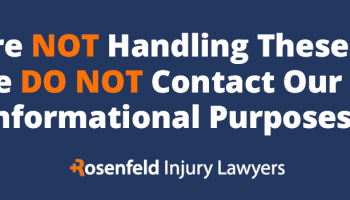In providing services to the general public, the government must still meet the standard of care that is expected of them. Even though they are sovereign, they may still consent to lawsuits in certain circumstances. We are often asked can you sue the government when an employee or the federal agency itself has injured you.
If you have been injured in certain types of accidents, you can sue the federal government or a municipal government agency. Still, there are special rules that attach to these lawsuits that you must strictly follow or risk losing your right to financial compensation.
The attorneys at Rosenfeld Injury Lawyers can help you seek compensation when you are suing the government for negligence.
How the Concept of Sovereign Immunity Works
The legal concept of sovereign immunity stands for the fact that the government cannot be sued without its consent. In order for you to be able to sue a federal agency or a state government, there needs to be a specific law that allows for the suit. The federal government’s consent to a such lawsuit is found in specific laws.
There are such laws in both the federal and state books:
- The Federal Tort Claims Act (FTCA) allows you to sue the federal government for an action that a government employee commits within the scope of their official duties. These lawsuits are usually based on negligent acts, but you can also sue for intentional misconduct. You can sue for personal injury or the wrongful death of a loved one.
- There are other laws on the books that allow for lawsuits based on specific occurrences. For example, the federal government may be sued under special pollution laws for environmental damage that it causes. You may also sue a government under property law when they have taken your property under eminent domain.
- There are similar laws in individual states. For example, there is a law called the Illinois Court of Claims act that allows a lawsuit against the state for a negligent or wrongful act. There is also a Local Governmental and Governmental Employees Tort Immunity Act that controls what lawsuits can be brought against a local government for personal injury.
Personal Injury Claims Against the Government
There are numerous reasons why you would need to sue the government for acts committed by federal employees or people who work for the state or local government.
The most common reason for lawsuits against the federal government is when you are injured in a crash with government agency vehicles. The federal government has hundreds of thousands of official cars, and they are often involved in accidents.
One of the most common types of car accidents caused by the federal government is a crash with a mail truck driven by a post office employee. Other government agency vehicles are also found on highways and city roads with frequency. For instance, you could suffer property damage or personal injury in a crash with military vehicles.
You may be injured in government office buildings when government agencies do not take the appropriate steps to keep the premises safe (injured employees may have different rules when they are hurt on the job).
Another reason why you may sue local governments is when they fail to take reasonable measures to maintain roadways and sidewalks. The roads could be in an unreasonably dangerous condition, or they may delay clearing roads in inclement weather.
Service Members May Not Sue Federal Agencies
There is one group of people on the government’s payroll who cannot file a claim against the government for personal injuries. There is a doctrine created by the United States Supreme Court that forbids lawsuits by service members against the federal government for injuries connected with their service.
The Feres Doctrine is very broad and covers practically every type of incident and accident. Congress recently changed the law to allow service members to file claims for injuries that they suffered from medical malpractice.
For example, in the ongoing Camp Lejeune water litigation, Congress had to pass a specific law that gave injured servicemembers and their families the legal ability to sue the federal government.
The Administrative Claim Process Through a Government Agency
Dealing with government agencies is not much different than filing a claim with an insurance company. Even though the federal and state governments self-insure, they still do not want to write a check from their budget to pay for your injuries.
They may use some of the same tactics that we warn you that insurance companies use by unreasonably denying your claim or trying to underpay your damages. You would still need a law firm experienced in filing FTCA claims. You should have an attorney file the claim on your behalf.
Lawsuits Under the Federal Tort Claims Act
Under the Federal Tort Claims Act, you must first approach the federal agency with your claim. They must be allowed the opportunity to review your claim to decide whether they will make you a settlement offer. You cannot file suit in federal court until you go through the appropriate federal agency first. We can explain the process to you at your initial consultation.
The agency’s decision will either deny your claim entirely, or they will make you a settlement offer. You can attempt to negotiate compensation with the federal agency. If you are unsatisfied with the result, you can bring your case to the United States District Court, where a federal judge or jury will hear your case and issue their own decision.
Federal Tort Claims Act Procedure
You would need to have a detailed knowledge of federal procedure in order to handle your own claim with the federal government. This is not knowledge that many people have, making it crucial to hire an attorney who knows federal venues and how to sue the government.
Dealing with federal agencies is a heavily archaic process, with time delays and plenty of paperwork.
In order to sue the federal government, you would begin by filling out a standard form. Since it is the government, everything seems to be based on a form. In an FTCA claim, the form is called Standard Form 95.
The SF-95 is not an absolute legal requirement to file a claim, but it is helpful because you can put all of the information about how the incident occurred and the amount that you are seeking in one place. You should pay careful attention when filling out this form because it would be the statement of your claim.
Special Rules for Suing the Federal Government
Whenever you are suing the government, you cannot get punitive damages like you may be able to obtain in a normal personal injury lawsuit. The government has waived its sovereign immunity, but it has not waived them to the full extent where a jury could punish them. The FTCA explicitly rules out punitive damages.
The same rules apply when you are applying state or a local government agency. State tort claims act also rules out the possibility of punitive damages. Depending on the state in which you file your claim, there may also be damage caps that limit the amount of your recovery.
States and the federal government self-insure, so they are looking for any possible way to limit their own liability for your damages.
When you are filing a claim against a governmental entity, you must also provide notice of claim to them. In many cases, you will need to do this in a timely manner. The timeframe is much quicker than the usual time limitations in a personal injury lawsuit.
A Federal Government Employee Cannot Be Personally Sued
There is a common law rule that a federal employee cannot be sued in a formal lawsuit for a negligent act, so long as the alleged wrongful conduct was within the scope of their official duties. In that way, a federal employee is different from a private person. Even federal park rangers or law enforcement officers cannot be sued for things like excessive force.
There is a statute called the Federal Employees Liability Reform and Tort Compensation Act of 1988 that extends absolute immunity for torts to federal government employees, regardless of whether the act was discretionary or not. Filing a claim against the federal agency is your only recourse.
The same principles hold true when filing a claim under state law.
Lawsuits Against the Government for Actions of Contractors
The government often hires contractors to do its work for it because outsourcing can be more cost-effective than having tasks performed by a government employee. When the government hires companies to do its work, the legal treatment is different from independent contractors.
If a contractor is acting as a government employee, you may file a valid claim against the federal government for the actions of the contractor. In fact, if you sue the contractor directly, they may assert a government contractor defense that could make it more difficult to sue them.
Call Our Office for a Free Consultation
The law firm of Rosenfeld Injury Lawyers works with injured clients to file both Federal Tort Claims Act cases and lawsuits against a state government agency. An experienced lawyer knows the special rules that apply and what you must do to recover financial compensation.
To reach a personal injury lawyer, you can call us today at (888) 424-5757 or send us a message online. We will schedule your free consultation where you can discuss your case and learn more about your legal options.
Once we form an attorney-client relationship, we will go to work on your case. Our personal injury lawyers work for you on a contingency basis, meaning that we are only paid if you win your personal injury lawsuit. We offer you a free evaluation of your personal injury case.











